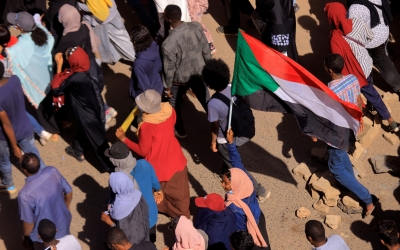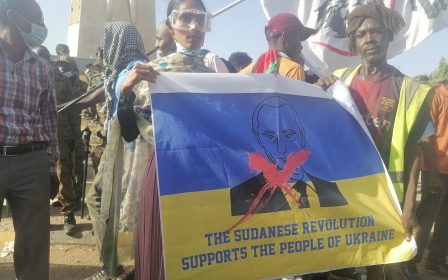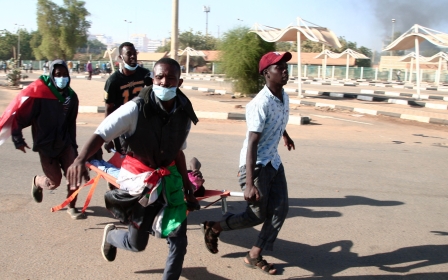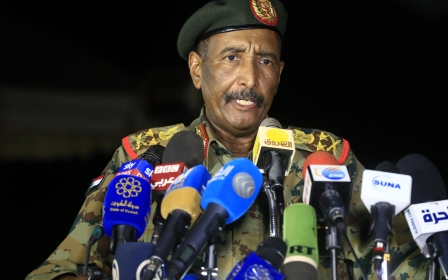Sudan: Police and militias attack civilian protesters with knives and machetes
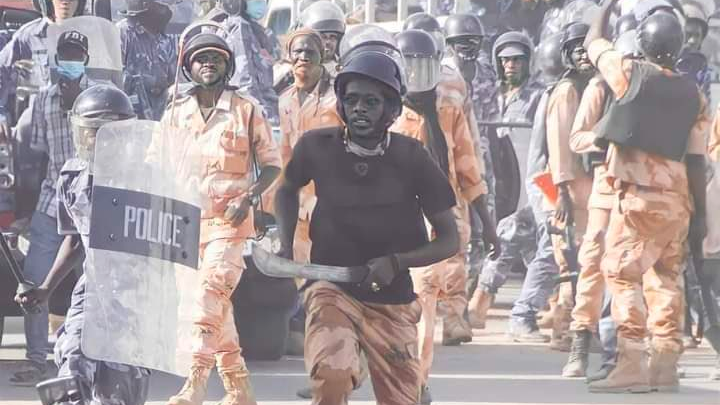
Sudanese security forces used knives and machetes to stab protesters at a demonstration in Khartoum yesterday, hospital data obtained by Middle East Eye shows, as the country's military government continues its crackdown on civilian opposition.
A doctor in the Sudanese capital, who requested anonymity for security reasons, told MEE she had seen four protesters, all young men, treated for stab and cut wounds in the capital's hospitals. All had been attacked by police or security officers. Two of the victims are in a critical condition.
Images and video footage circulating on social media show police and soldiers wielding knives and machetes, as well as carrying arms. One photograph, verified by Middle East Eye and citizen journalist Khalid Taha, shows a Sudanese soldier holding a massive machete. MEE contacted the soldier on Facebook but received no response.
Taha said that police and militia forces "are sending a clear message that teargas, snipers’ rifles and shotguns are not bloody enough to terrorise peaceful protesters. They used machetes and combat knives in the march."
As thousands took to the streets to demonstrate against last October's military coup and worsening living conditions, a 23-year-old protester was killed after he took "a live bullet to the chest", the Central Committee of Sudan Doctors said.
Hassan Ibrahim, 23, was present at the march. He told MEE: "I saw them, wearing the central reserve police uniform and carrying machetes in their hands, waving them in the air to intimidate protesters. That was near the Khartoum central station."
"Knives leave less evidence," said another activist present at the march, when asked why police forces were using knives and machetes as well as guns.
Cameron Hudson, a senior fellow at the Africa Center and a former CIA analyst, told MEE that diplomatic sources had confirmed to him the use of knives and machetes by Sudanese forces.
"It's a sign of changing tactics and the fact that recent US sanctions have done nothing to chasten the police forces on the front lines of responding to protesters," Hudson told MEE.
'The regime has been getting more brutal'
Sudan has had both tens of billions of dollars of debt relief and an aid programme frozen by the World Bank, the United States and other western governments, in response to the 25 October coup led by Sudanese Armed Forces general Abdel Fattah al-Burhan, who is now the country's de facto leader.
The US has also recently sanctioned Sudan’s Central Reserve Police for "serious human rights abuses committed during protests calling for democracy".
Russia's invasion of Ukraine is contributing to an increasingly dire economic situation, with the Sudanese pound plummeting against the dollar as prices of food, fuel and basic commodities soar. Both Russia and Ukraine are major exporters of wheat.
One Khartoum-based analyst, who asked not to be named, said that "the regime has been getting more brutal as economic woes look set to bring even more people out onto the street. This is especially true with Ramadan starting tomorrow."
The Sudanese resistance committees, key leaders of the revolutionary movement, have earmarked 6 April as a big day for demonstrations. Ramadan proved to be a key period for the movement that brought down longtime autocrat Omar Hassan al-Bashir, with protesters able to more easily come together and take part in sit-ins and other acts of resistance.
The death of the protester on Thursday brings to 93 the number of people killed in a crackdown on mass demonstrations that have been ongoing since the 25 October coup last year, AFP reported.
On the streets of Khartoum, protesters chanted, “The military should go back to the barracks”, and “Down with the government of hunger”.
"We have expressed serious concern about the continued human rights violations we are seeing and we call on the international community to exert more pressure on coup leaders to stop the horrific violations," Husam el-Mugamar, founder of Sudan's Doctors for Human Rights group, told MEE.
On 30 March, Burhan was in Cairo to meet Egyptian President Abdel Fattah el-Sisi. The two military leaders held one-on-one talks and there followed an extended meeting between their delegations.
Additional reporting by Mohammed Amin
Middle East Eye delivers independent and unrivalled coverage and analysis of the Middle East, North Africa and beyond. To learn more about republishing this content and the associated fees, please fill out this form. More about MEE can be found here.


